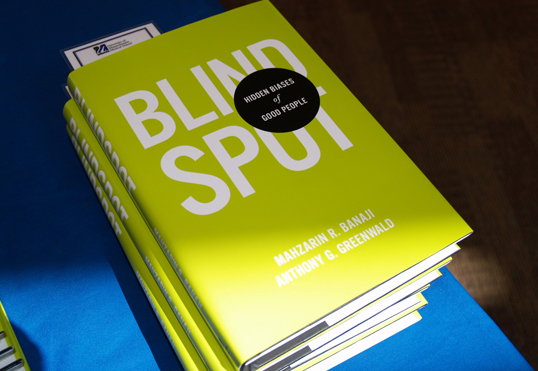 In a thought-provoking conversation centered on the uncomfortable fact that everyone, regardless of their best intentions, harbors biases that they are largely unaware of, UMass Medical School launched the annual Diversity Campus Read.
In a thought-provoking conversation centered on the uncomfortable fact that everyone, regardless of their best intentions, harbors biases that they are largely unaware of, UMass Medical School launched the annual Diversity Campus Read.
Led by Jeroan Allison, MD, MS, and Suzanne Cashman, ScD, the conversation was designed to encourage members of the UMass Medical School and UMass Memorial community to think about bias and its impact on behavior, and to engage them in reading Blindspot: Hidden Biases of Good People. The book explores the unconscious biases that all people “carry from a lifetime of exposure to cultural attitudes about age, gender, race, ethnicity, religion, social class, sexuality, disability status and nationality,” according to the authors Mahzarin Banaji and Anthony Greenwald. Banaji will be at UMMS on Oct. 28 for a campus-wide event dedicated to discussion of the book.
Blindspot explores data from the Implicit Association Test, a tool used in social psychology research designed to measure automatic associations between attributes and concepts, which can illuminate hidden biases. The test was developed by Banaji and Greenwald along with colleague Brian Nosek in 1995 and they co-authored Blindspot in 2013 to explain the science behind the now widely used test.
Dr. Allison, professor of quantitative health sciences and medicine and associate provost for health disparities research, began the conversation by sharing his own experience with taking the Implicit Association Test, which revealed that in his work as a physician, his own hidden biases were subtly shaping the way that he interacted with and thought about certain groups of patients in his practice. He related a story about a new patient with diabetes that he assumed wouldn’t be able to manage his treatment based on how he looked.
“I categorized him based on his looks—he was rough looking, with tattoos, he had been incarcerated—and I just assumed that he wouldn’t be able to manage his diabetes,” said Allison. In reality, the patient was very educated about his disease and very motivated to manage it and, in fact, knew more about diabetes treatment than many physicians. “Becoming aware of our own biases brings about change,” said Allison.
Dr. Cashman, professor of family medicine & community health and director of community health for the Department of Family Medicine & Community Health, discussed how she and Allison have worked to incorporate implicit association testing into the School of Medicine curriculum in the Social Determinants of Health course, by requiring students to take the test and write an essay about the results. Many students are surprised by the results and some are defensive, but Cashman noted that just because people have hidden biases doesn’t mean they are racist, or sexist or classist.
“Human bias is not racism—our brains naturally categorize things,” she said.
While many students like to believe they live in a post-racial society and don’t need to be educated about bias, according to Allison, the IAT reveals that bias still exists and can impact how care is delivered. The goal is to get students to think about and talk about bias before they become doctors.
After launching the conversation, Cashman and Allison fielded numerous questions about bias toward people most similar to ourselves; bias against those who speak with unfamiliar accents; and micro-inequities and how they affect self-esteem and professional engagement.
Deborah Plummer, PhD, vice chancellor for diversity and inclusion, who opened the program, encouraged members of the UMMS and UMass Memorial community to read the book and attend the Oct. 28 workshop that will be led by Banaji, and to engage in other conversations about unconscious bias in preparation for the workshop. Copies of the book can be borrowed from the Lamar Soutter Library.
The Blindspot: Hidden Biases of Good People workshop and discussion will take place in the Sherman Center auditorium on Oct. 28 from 3 to 5 p.m., with a reception following in the Sherman Center Cube and Atrium. Information about registration for the Oct. 28 event and upcoming brown bag lunch discussions about Blindspot will be available on the Diversity and Inclusion website as details are finalized.
Related link on UMassMedNow:
Diversity Campus Read launches with conversation about hidden bias